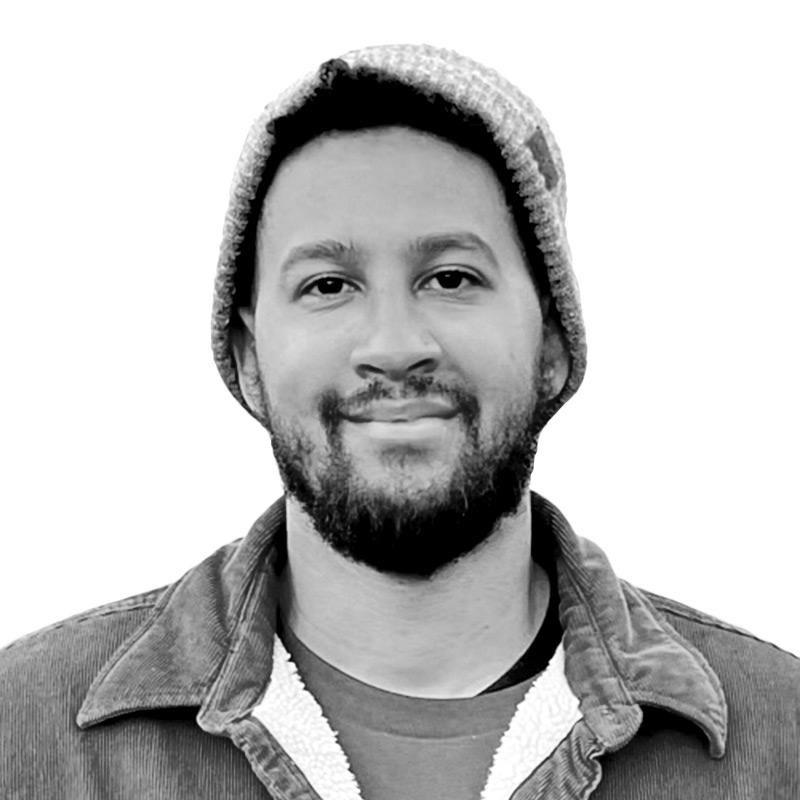

The way this season of Atlanta has gone, you’d be forgiven for thinking its latest episode would center on anyone besides the main characters. Two out of five installments have been stand-alone stories, and initially, Episode 6 seems prepared to continue the pattern. It opens in an airy, regal-looking factory space in London, with a trio of white Europeans who are involved in the fashion industry. One, a designer, showcases his new work to an executive of the label. The designer’s new aesthetic is apparently inspired by a combination of New York’s Central Park, an Israeli artist’s cat illustration, and American sports jerseys. This is clearly the type of brand that can print anything it wants on any material of clothing and sell a million copies.
This fashion house may excel at moving streetwear, but unfortunately it’s bad at not being ignorant. To commemorate the label’s fifth anniversary, the designer jersey features a No. 5 on the back, along with the name “Central Park.” Unsurprisingly, this doesn’t seem to have gone down well; the episode picks up with a meeting between the designer, his marketing colleague, Alfred, and Earn. The label, which we later learn is called Esco Esco, wants to correct its “mix-up” and is hoping to recruit Paper Boi to join its new diversity advisory board. Esco Esco can’t give Alfred cash—that’d be a bad look—but it is willing to donate to a charity of his choosing and offer the rapper a bunch of custom suits and designer clothing.
Alfred is down for the free hookup—all he has to do is attend some corny press event, right? But Earn can’t help but feel his cousin is selling out. “This feels like an Uncle Tom photo op,” Earn says, prompting a predictable rebuke from Alfred: Fuck the haters, the streets know who I am. Earn’s not necessarily opposed to this “partnership,” but if they’re going to do this, shouldn’t they really do it? How about a guaranteed five-year seat on the diversity board? Start their own program; give Black people the resources to support their own businesses and communities. “A Reinvest in Your Hood campaign,” Earn explains. But Al is hearing none of it. That’s some “Martin Luther King, Ebenezer Baptist Church shit,” he concludes. And what happens to idealists like that? “They kill him,” the cousins recite in chorus.
Elsewhere in London, white people aren’t just committing faux pas in the fashion world. One of Esco Esco’s assistants shows up seeking clarification on Darius’s lunch request for jollof. “It’s Ghanaian, right?” Darius can’t believe his ears: “No … who told you that?” (Hilariously, Ghana has a fierce rivalry with Darius’s native Nigeria about which country makes the best version of the dish.) Darius says he’s heard of a place that serves the cuisine, but it’s on the other side of town. Fortunately, the assistant, Sharon, is happy to give him a lift.
When they arrive, Darius feels at home. He hits it off with the server, who is delighted to see Darius knows the menu inside and out. Sharon, meanwhile, has lots of questions: What’s the program on TV? What does Naija mean? What’s the song playing over the speakers? There’s growth potential here, she surmises, and she expresses her love of the food and the owner, Mimi. Darius doesn’t realize it, but Sharon is taking stock of her surroundings. When he returns to the restaurant some days later, he’s startled to find the establishment is closed. Right next to it, on the curb, is a bougie-looking food truck: “Naija Bowl.” Guess who’s inside, wearing chef’s whites? Sharon, who offers him a peach-reduction jollof bowl. She’s named the item “Darius,” in his honor. He asks about Mimi, but Sharon never exchanged info with her—despite saying earlier she wanted to get Mimi’s business card to collaborate. Disgusted, Darius walks off and throws the bowl in the garbage. A white woman jogging by tells him he should recycle it, twisting the dagger.
In his freshly tailored suit, Al rolls up to Esco Esco’s press event and hears the designer from earlier proclaim that he is “the least prejudiced person in this room. In the world, even.” Al knows he’s about to witness some bullshit, but a fellow member of the diversity board, Khalil, assures him that apologizing for white people is actually pretty great. “It’s the best. I haven’t paid for a meal in 73 police shootings.” One of the reporters in the room proceeds to ask the committee if this partnership has outright ended racism. “Um, fuck no,” Paper Boi concludes, drawing stunned gasps from the audience. Khalil interjects: “What he means is that, with our new initiative, we will be done with racism by 2024.” Applause rings out.
Having witnessed this buffoonery, Al changes his tune. As the diversity board sits down and prepares to get to work—meaning, for the majority of its members, coming up with ways to turn white guilt into financial benefit—Alfred pitches an idea he’s been “thinking about for a long time.” That’s right: Earn’s idea, down to the very same “Reinvest in Your Hood” title. As much as Al talks down to his cousin, he actually seems to respect Earn’s intelligence—even if he won’t say it to his face. Paper Boi urges the group of pseudo-activists to pursue meaningful change. After one of the members reveals she secured a discretionary fund of 60,000 euros, the board begins workshopping Al’s plan: scholarships, an apprentice program for Black fashion students, the whole shebang. The only thing left to do is pitch the concept to the company, so Al takes out his phone and starts recording the spiel for approval.
The remaining subplot of “White Fashion” has to do with Van. She went missing at the end of Episode 3 and we haven’t heard from her since, save for a single thumbs-up emoji last week when Earn asked if she was OK. In Episode 6, she’s back on screen, appearing at a swanky London hotel that Earn also happens to be in. Naturally, Earn asks where she’s been. But Van isn’t fussed. She’s been shopping, what’s the big deal? It’s then when a random white woman aggressively confronts Van, claiming the bags in her hand have been stolen. Thankfully, randomly accusing Black strangers of theft doesn’t really fly like it used to, and Earn is able to finesse the misunderstanding into a free night at the luxury hotel.
Just as Paper Boi said earlier in the episode, Earn and Van’s instance of good fortune doesn’t mean that racism is over. The final Esco Esco commercial announcing the Reinvest in Your Hood campaign is a stark reminder of that. The stylish black and white ad stars a couple of shirtless, pants-sagging Black guys … and then everyone else. Teenage white girls in ski outfits. Hasidic Jews. A gay cowboy couple. They’re all saying, “We’re all from some hood.” And there’s Paper Boi’s voice from the pitch recording, apparently telling all of society to “Reinvest in your hood.”
As you can imagine, Paper Boi is not thrilled with this final product. In fact, he is fucking furious. “You All-Lives-Matter’d my shit!” he screams at the Esco Esco crew, which includes Khalil and the fashion designer. “No, it’s more inclusive like this. It’s more [of an] attitude of collaboration,” the latter says. As if matters couldn’t get worse, Al finds out the proceeds haven’t been sent to Black communities in Atlanta, but to the Red Cross, whose donation efforts have been questioned in the past. “It’s the worst one!” Al shouts back. “Them niggas ain’t ever gonna see that fucking money now.”
Khalil leads Al out of the room and drops what I suppose could be called the cold, hard truth. “Ask yourself this: Why? Why would a company make a project that would teach Black people to stop buying their products and reinvest in their own? Why would they fund their own demise?” Al can only suck his teeth. “That’s not a business. That’s a charity,” Khalil continues. “That’s why you need your own nonprofit. You control that money.”
The moral of the story, it seems, is that Earn was right. Al initially had leverage to demand a diversity program on his own terms. Instead, he accepted material goods to do it Esco Esco’s way, and this is the ultimate result. Then again, Esco Esco did say the charity could be of Al’s choosing. Just like Sharon said she wanted to work with Mimi, not buy out her business. Maybe the real lesson, Atlanta is saying, is to be careful with which white people you trust.
Episode 6 concludes back in the hotel room with Earn and Van. The lighting is dim and warm, the bar is fully stocked, the music is lovely—the vibe is exquisite. Earn apologizes for earlier: “I kinda feel like I was attacking you. I was just worried.” Van slinks up to Earn, in her hotel robe, and tells him he worries about everything. He probably shouldn’t, she adds. Like Darius told her a few episodes ago, this could all be a simulation. Van, with her arms wrapped around Earn, seems to be in a state of extreme apathy. She’s been galavanting around Europe for weeks as their daughter, her mother, and her supposed boyfriend wait for her back home. But for reasons still unknown, she doesn’t care. It’s no surprise, then, when she and Earn kiss.
Earn wakes up in the hotel the next morning, mirroring the opening scene in Copenhagen from Episode 2. This time, there’s no strange woman next to him. There’s no Van, either. Atlanta may continue to be unpredictable on a week-to-week basis, but a showdown with Van seems all but certain.
This article has been clarified to include reference to the Central Park Five.

